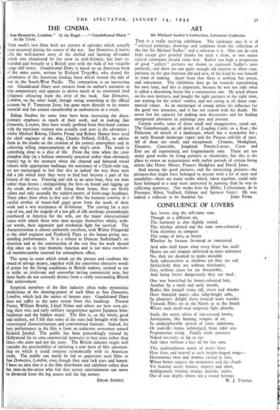THE CINEMA
THIS week's two films both are reports of episodes which actually have occurred during the course of the war. San Demetrio, London, tells the well-known story of the shelled and burning oil-tanker which was abandoned by her crew in mid-Adintic, but later re- boarded and brought to a British port with the bulk of her valuable cargo still intact. Guadalcanal Diary is based on an American book of the same name, written by Richard Tregastis, who shared the adventures of the American landing force which turned the tide of war in the South-West Pacific. The comparison is an interesting one. Guadalcanal Diary uses extracts from its author's narrative as film commentary and appears to derive much of its emotional (and religious) colouring from the - style of the book. San Demetrio, London, on the other hand, though owing something to the official account by F. Tennyson Jesse, has gone more directly to its source material and has gained considerably in authenticity as a result.
Ealing Studios for some time have been increasing the docu- mentary emphasis in much of their work, and in making San Demetrio, London, they have wisely profited from first-hand contact with the merchant seamen who actually took part in the adventure ; whilst Michael Balcon, Charles Frend and Robert Hamer have used the chief engineer of the ship, Charles Pollard, O.B.E., to advise them in the studio on the creation of the correct atmosphere and in achieving telling impersonations of the ship's crew. The result is something dose to a slice of life. From the time when the crew abandon ship (in a fashion eminently practical rather than obviously heroic) fun to the moment when the charred and battered vessel refuses with appropriate badinage the assistance of a Clyde-side tug, we are encouraged to feel that this in indeed the way these men did a job which later they were to find had become a part of the history of the sea. Freezing and sick in an open boat, they are men rather than heroes ; extinguishing the fires on board and rigging up the crude devices which will bring them home, they are firstly sailors and only secondly the subject-matter of front-page headlines. Their jokes (how often in this sort of film the humour_consists of a careful overlay of music-hall gags) grow from the needs of their work and a wry acceptance of ill-fortune. The craving for a nice cup of tea, and the tragedy of a lost gift of silk stockings painstakingly purchased in America for the wife, are the major conversational issues with which these wise men occupy themselves whilst, with- out words, their ingenuity and resolution fight for survival. The characterisation is almost uniformly excellent, with Walter Fitzgerald as the chief engineer and Frederick Piper as the bosun giving out- standing performances. It is a tribute to Duncan Sutherland's art direction and to the construction of the sets that the work aboard ship takes on its wile thematic function and is not mere mechani- cal mumbo-jumbo inserted for atmospheric effect.
The scene in court which winds up the picture and confirms the award of salvage Money, together with the somewhat obtrusive words of praise for the living conditions in British tankers, seemed to me to strike an irrelevant and somewhat jarring commercial note, but these faults do not seriously detract from a really outstanding British film achievement.
Sceptical members of the film industry often make pessimistic predictions of the drawing-power of such films as San Demetrio, London, which lack the names of famous stars. Guadalcanal Diary does not suffer to the same extent from this handicap. Preston Foster, William Bendix, Lloyd Nolan and others are here seen pit- ting their wits and early military inexperience against Japanese bom- bardment and the hidden sniper. The film is, an the whole, good and realistic, yet I felt that some of the stars had brought with them stereotyped characterisations and conventional humour. Indeed, the best performance in the film is from an unknown newcomer named Richard Jacek& The public has been painstakingly trained by Hollywood (in its own commercial interests) to buy stars rather than films—the actor and not the story. The British industry might well consider the practicability of initiating a new basis of film salesman- ship on which it could compete economically with its American rivals. The public can surely be led to appreciate such films as San Demetrio, London, even though they may lack stars and luxury. I have an idea that it is the film distributor and exhibitor rather than the man-in-the-street who feel that screen entertainment can never be divorced from the big names and the big money.
EDGAR ANSTRY.


























 Previous page
Previous page